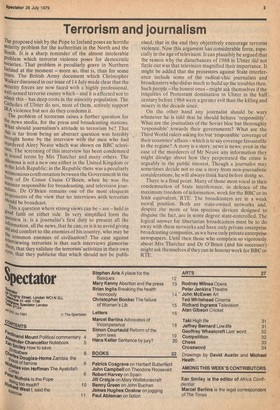Terrorism and journalism
The proposed visit by the Pope to Ireland poses an horrific security problem for the authorities in the North and the South. It is a sharp reminder of the almost intolerable Problem which terrorist violence poses for democratic societies. That problem is peculiarly grave in Northern Ireland at the moment — more so, that is, than for some Years. The British Army document which Christopher Walker discussed in our issue of 14 July made clear that the security forces are now faced with a highly professional, well-armed terrorist enemy which — and it is affected not to admit this — has deep roots in the minority population. The Catholics of Ulster do not, most of them, actively support 1RA violence but nor do they condemn it. The problem of terrorism raises a further question for he news media, for the press and broadcasting stations, What should journalism's attitude to terrorism be? That this is far from being an' abstract question was forcibly urought home by the interview with the men who had laurdered Airey Neave which was shown on BBC televi 8.10u. The screening of this interview has been condemned it round terms by Mrs Thatcher and many others. The Illemma is not a new one either in the United Kingdom or 10 the Irish Republic: in the Republic there was a.peculiarly ilerirnonious confrontation between the Government in the 0.rirl of Dr Conor Cruise O'Brien, when he was the nialister responsible for broadcasting, and television journalists. Dr O'Brien remains one of the most eloquent 13,43Ponents of the view that no interviews with terrorists Should be broadcast.
r, This a question where strong views can be .-are — held in Good faith on either side. In very simplified form the restion is: is a journalist's first duty to present all the ,n,Iormation, all the news, that he can; or is it to avoid giving gfishi and comfort to the enemies of his country, who may be r„! Common enemies of civilisation? The case against tgi:erviewing terrorists is that such interviews glamorise e,8111, that they validate the terrorists' activities in their own Yes, that they publicise that which should not be publi cised, that in the end they objectively encourage terrorist violence. Now this argument has considerable force, especially in the age of television. It can plausibly be argued that the reason why the disturbances of 1968 in Ulster did not fizzle out was that television magnified their importance. It might be added that the protestors against State interference include some of the radical-chic journalists and broadcasters who did so much to build up the troubles then. Such people the honest ones —might ask themselves if the iniquities of Protestant domination in Ulster in the half century before 1968 were a greater evil than the killing and misery in the decade since.
On the other hand any journalist should be wary whenever he is told that he should behave 'responsibly'. What are the journalists of the Soviet bloc but thoroughly 'responsible' towards their governments? What are the Third World rulers asking for but 'responsible' coverage of their countries' affairs—which is to say coverage favourable to the regime? A story is a story, news is news; even in the case of the murderers of Mr Neave any information they might divulge about how they perpetrated the crime is arguably in the public interest. Though a journalist may sometimes decide not to use a story from non-journalistic considerations, he will always think hard before doing so.
There is a final point. Many of those most vocal in their condemnation of State interference, in defence of the maximum freedom of information, work for the BBC or its Irish equivalent, RTE. The broadcasters are in a weak moral position. Both are state-owned networks and, despite the more or less specious devices designed to disguise the fact, are in some degree state-controlled. The logical answer for libertarian broadcasters must be to do away with these networks and have only private enterprise broadcasting companies, as we have only private enterprise newspapers. Until then those who complain so vigorously about Mrs Thatcher and Dr O'Brien ,(and his successor) might ask themselves if they can in honour work for BBC or RTE.






































 Previous page
Previous page